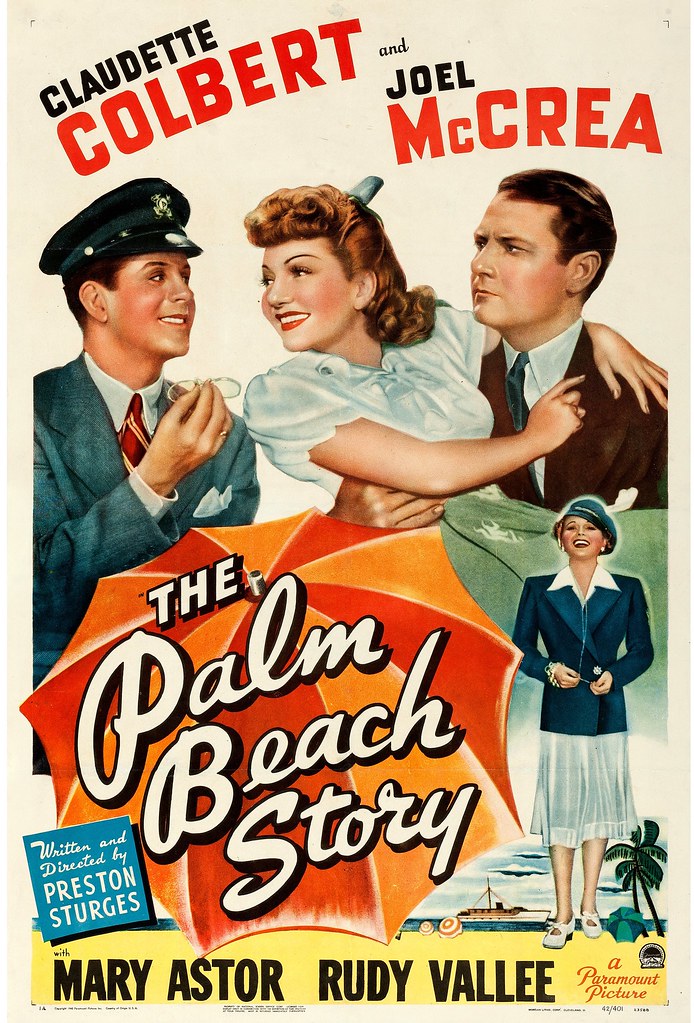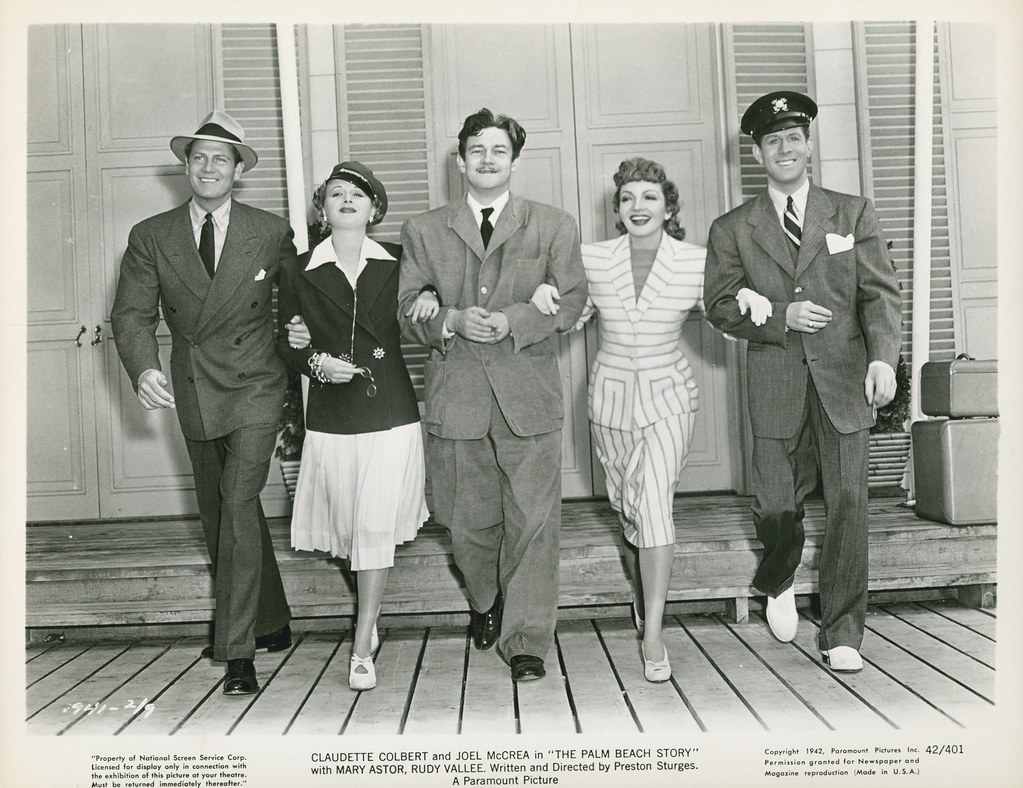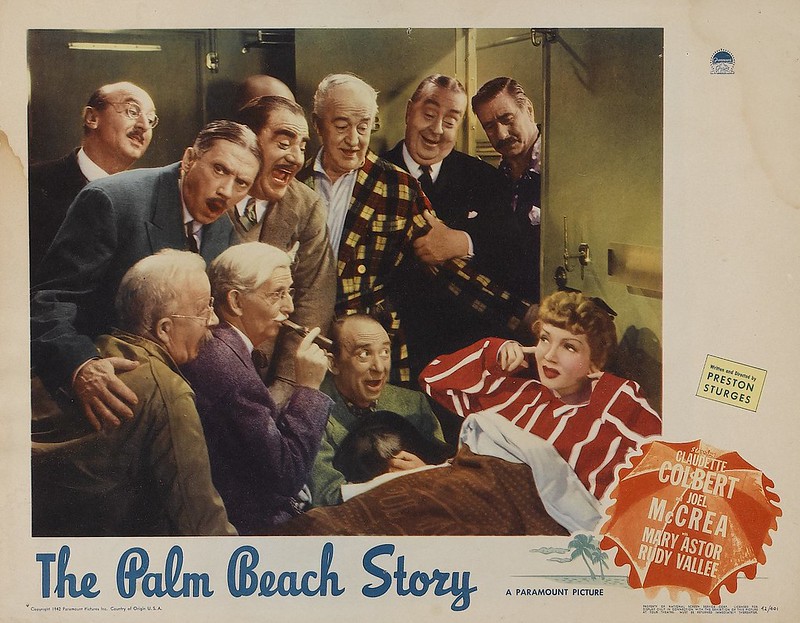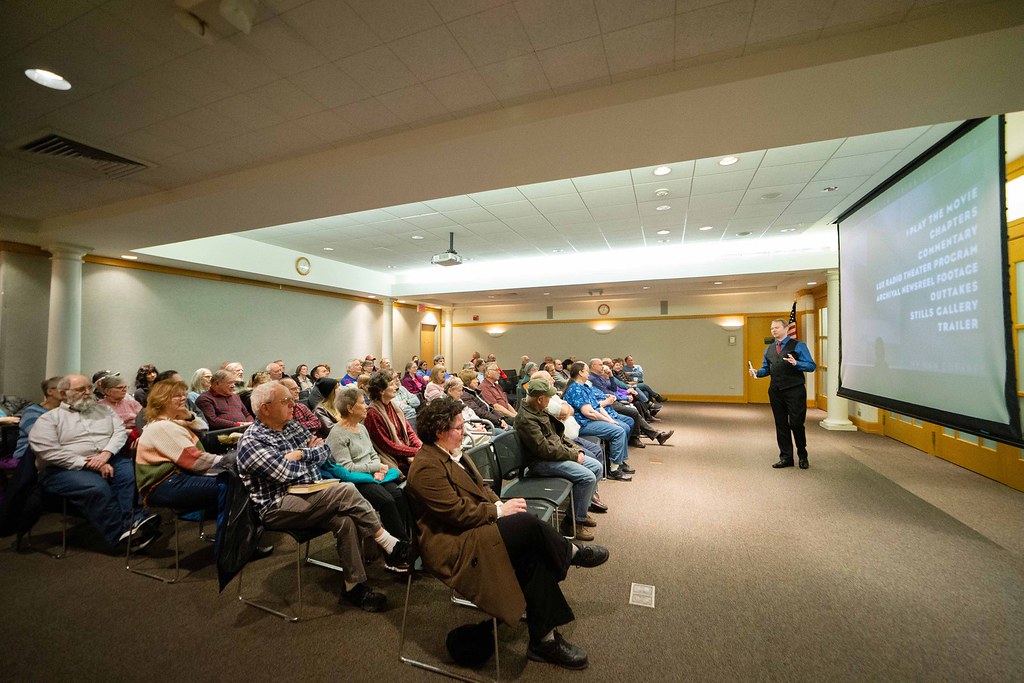The following is a transcript of my presentation on The Palm Beach Story, which was screened at the Park Ridge Public Library on May 26, 2022. This was the season finale to our “Legends of Laughter 3” film series. We had 32 patrons in attendance.
“’You’ll get over it,’ says the Wienie King about Gerry’s trouble. ‘You’ll get over being young, too. Someday you’ll wake up and find everything behind you. Gives you quite a turn.’ But this remarkable and funny film has its own ‘turn’ to give—however delayed it may be in coming to us. Sturges calculates what he’s really saying when he makes everything so free and painless. The tone is idyllic-sardonic. There is a slyness, even a wickedness, to the cheeriness: happy endings that remind us of the real endings—a pastoral with a kick to it.” ~ Film historian James Harvey
The Palm Beach Story is Preston Sturges’ chaotic comedy about marital relations. Like several other screwball films in our series, it’s a story of divorce and reunion. Tom Jeffers (Joel McCrea) is a provider who can’t provide, and Claudette Colbert the Park Avenue wife who’d make a better sister (or so she thinks). Gerry separates from Tom and heads to Palm Beach for a divorce. On the southbound train, she becomes mascot to the “Ale & Quail Club,” a group of wealthy sportsmen, before hooking up with pompous millionaire John D. Hackensacker III, played by Rudy Vallee. “Snoodles,” as he is known, is the sort who goes through life writing things down but never adding them up. When noble flop Tom shows up to reclaim his wife, he has to avoid the desirous clutches of Hackensacker’s over-sexed sister, played by Mary Astor.
Some of the highlights include William Demarest skeet-shooting in the dining car of the Pullman, and the cruel irony of Vallee, a popular radio crooner, serenading Gerry with “Good Night, Sweetheart” with Tom looking to reconcile. The Palm Beach Story features a brilliant script by Sturges with unforgettable secondary characters like The Wienie King, played by Robert Dudley, and Sig Arno as Toto– the houseguest of uncertain European origin who is about as unwelcome as Carlo in My Man Godfrey.
The role of Gerry was to have been Carole Lombard’s after she completed They All Kissed the Bride. However, after her death in a plane crash in January 1942, she was replaced by Claudette Colbert in this film and Joan Crawford in the other. The term screwball is often associated with Lombard due to her earlier performances in the genre, so it certainly would have been fitting had she starred in The Palm Beach Story, considered one of the final screwball comedies of the classic period.
But Colbert, who opened our season this spring in It Happened One Night and later appeared in Midnight, is also one of the great screen comediennes, and she holds this film together. She was certainly one of the most beautiful actresses of the era with those high cheekbones and arched eyebrows, and that face that only wanted to be photographed on the left. But it’s her intelligence on screen that radiates the most. Like most of the female protagonists in this series, she has a plan and her own way of achieving it, but with some help from unexpected sources. When the Wienie King pulls out a huge roll of money to pay her bills, it recalls John Barrymore’s fairy godfather in Midnight, another film in which Claudette mixes with the elite of society.
Joel McCrea is one of my favorites and we’ve seen him before in a Preston Sturges movie when we played Sullivan’s Travels a few years ago. Here, he has less to do with his main task being to keep up with Colbert. Henry Fonda, who had starred in The Lady Eve, was a better actor, but he didn’t love Sturges the way McCrea did, and that’s probably why McCrea turned up in several of his films.
Singer Rudy Vallee reinvented himself in this film and gives a surprisingly good performance in this spoof of John D. Rockefeller. For someone who always came across as a bit of a stiff in his early movie career as “The Vagabond Lover,” Vallee is a natural with comedy. His on-screen sister in the film, played by Mary Astor, is equally memorable and nearly steals the film. In addition, Sturges often crowds the frame with his unofficial stock company of character actors, including recurring favorite William Demarest, as well as Robert Warwick, Jimmy Conlin, Roscoe Ates, Robert Greig, and Chester Conklin.
Robert Dudley, another member of the stock company who plays the hard of hearing Wienie King, was born just four years after the American Civil War ended. He had studied at Lake Forest College to be a dentist. He appeared in numerous silent movies but became one of Sturges’ stock company in the 1940s. He will be forever known for this one small part in which his super-rich character doles out $700 to a grateful Gerry.
The world of the affluent is often depicted and poked fun at in screwball comedy, from Easy Living, which had been written by Preston Sturges, to films like The Philadelphia Story and The Lady Eve. The Chicago-born Sturges had grown up around rich people and knew the world of the haut couture that Jerry finds herself in. Sturges’ second wife was an heiress and through her he knew the famous and wealthy, and yet, he himself never lost his middle-class sensibility. His films often showed the flamboyant and sometimes preposterous lifestyles of the elite.
As a writer, films like Easy Living (which we played here) and Remember the Night were brilliant examples of what made Preston Sturges a success, but it was his first directorial efforts, Christmas in July and The Great McGinty, that made his reputation. His career soared between 1940 and 1944. The Palm Beach Story was Sturges’ fifth feature as director, and he was at the apex of his powers with this film. The story is driven by the characters, and you have the sense that he, Sturges, is discovering the story as we see it unfold in front of us. It’s not as neatly-structured as The Lady Eve, for instance. How could you explain, for no apparent reason, that delightful detour in which we spend time with the Ale and Quail Club? Does it add much to the main plot of Gerry’s flight from Tom? Not really, but who cares when it’s such a funny sequence.
Almost every scene in The Palm Beach Story reveals the wit of Sturges’ dialogue as well as its rhythm. It just carries the film along. Despite the outlandishness of the plot and the situations—I mean, Joel McCrea plays an inventor designing a runway in the sky, for one thing—there is an honesty behind the humor, particularly in regards to money and security. There is also a truthfulness about human nature that is probably more spot-on than many serious dramas of the same time.
The film has one of the most mystifying openings– set to the music of the William Tell Overture. It’s a wild, start-stop sequence set during Gerry and Tom’s wedding. There are freeze frames as the credits roll. Rest assured! All this makes a degree of sense at the end when the opening is explained. The ending to the film could be seen as a parody of the type of Hollywood “happy ending” that was typically enforced.
Closing Night 2022: Program Host Matthew C. Hoffman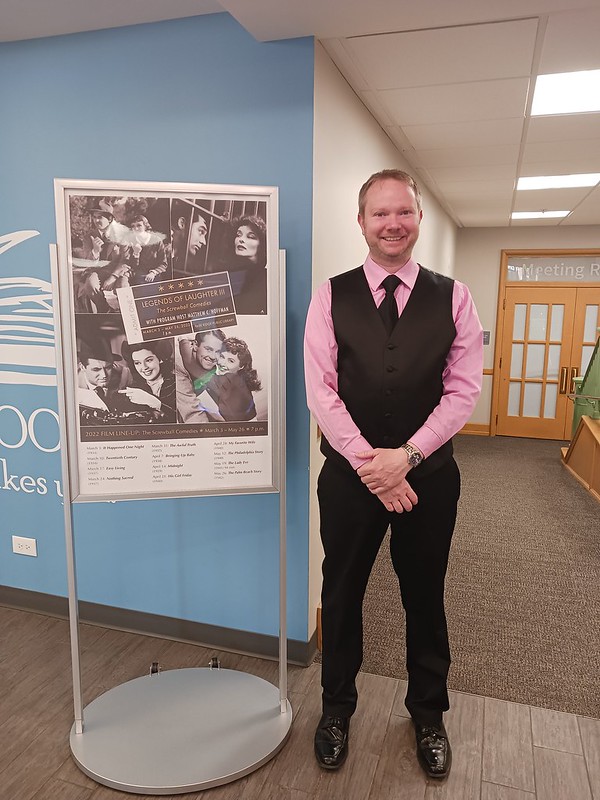
The Palm Beach Story wasn’t terribly popular at the time of its initial release. Executive producer Buddy G. DeSylva often fought with his temperamental star director. As a result of these studio battles, Sturges was eventually let go after he completed The Great Moment. He sought his independence elsewhere, including an ill-fated partnership with Howard Hughes. Thus began his slow decline, although Unfaithfully Yours, made in 1948 for 20th Century, is recognized as his last truly great film. But his greatest success came working within the studio system.
The Palm Beach Story is marking its eightieth anniversary this year. It’s one of my favorite Sturges films, and it’s the only one I’ve ever presented twice. Next week is actually the 20th anniversary of when I showed it at the LaSalle Bank Theatre on Irving Park Road in Chicago, which was a revival house where I played classic and lesser-known films every Saturday night. The theatre has since been converted into a Binny’s Beverage Depot. I’m fortunate to be able to play this one again. It might not have the reputation of a film like Bringing Up Baby, but honestly, I find The Palm Beach Story a lot funnier. I hope you will enjoy it as much I do. I think it’s a wonderful way to share one final laugh together.
~MCH
Postscript: We averaged 28 patrons during the course of our three-month, twelve-film series on screwball comedy. The highest-attended film was our Opening Night showing of It Happened One Night with 41. Our original Opening Night, however, was My Man Godfrey in March 2020. The attendance for that screening was over 70, so there was a significant drop-off due to Covid. Given the circumstances with many regulars still not comfortable attending a public event, we had a respectable average. As the pandemic wanes, we hope attendance will go up in 2023.
